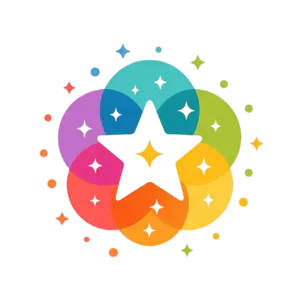Curriculum
Developing the Whole Brain
Japanese Values in Education
STEAM & Early Academics
Communication & Leadership Skills
First Step Program for Age 2
Developing the Whole Brain
whole brain training
By age 5, a child’s brain reaches 90% of its adult size. Neural circuits are formed and reinforced through repeated experiences.
Early stimulation is key because the brain’s plasticity decreases with age. Below are some of the abilities we aim to strengthen in our students.
Left Brain
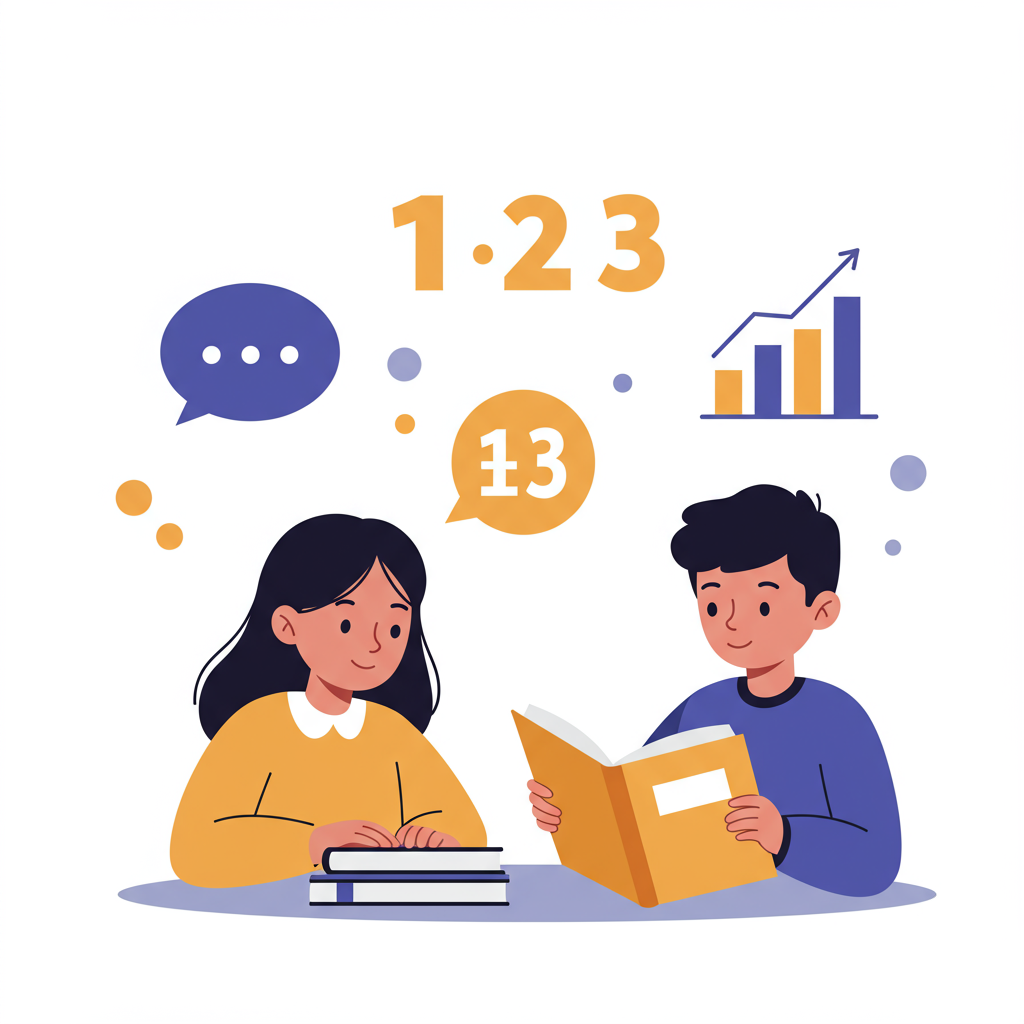
- Verbal communication
- Mathematical and sequential thinking
- Categorization and analysis
- Rule-following and attention to detail
Right Brain
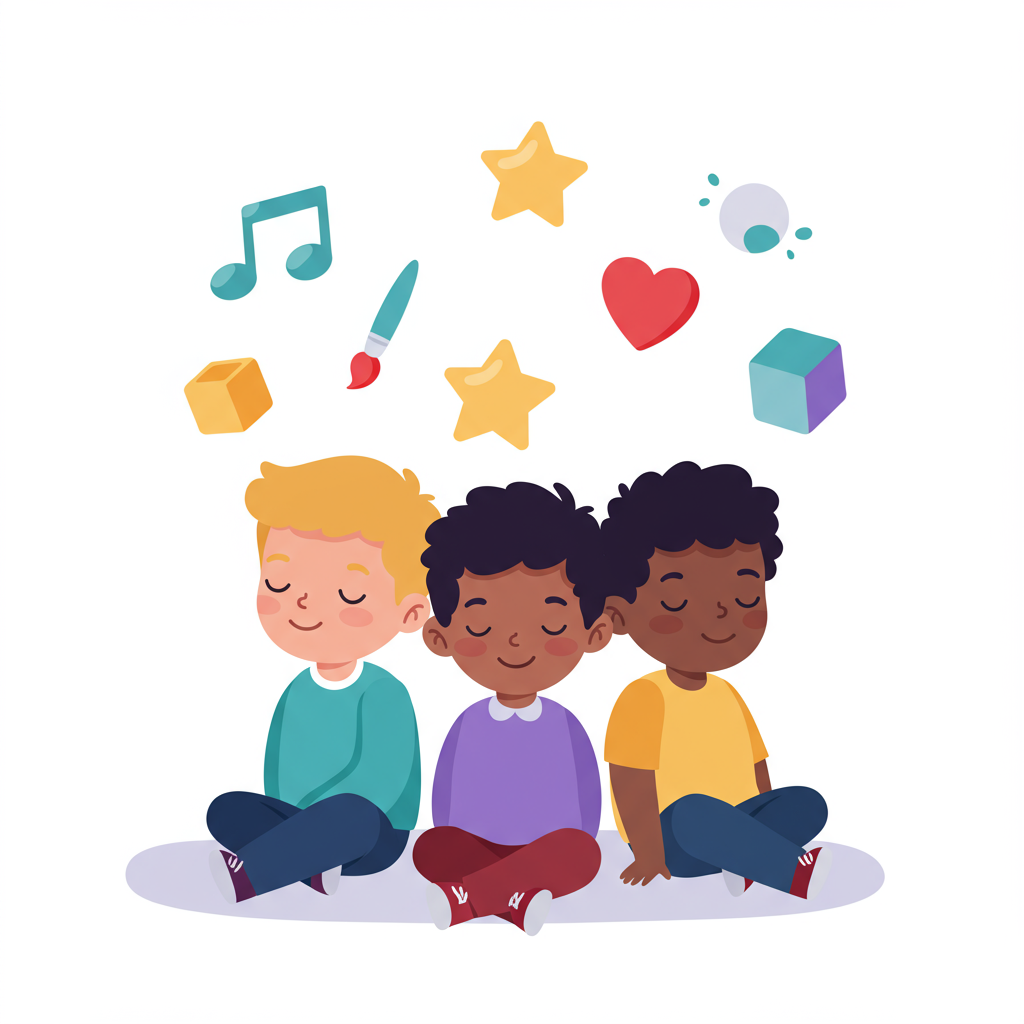
- Imagination and imagery
- Musical and spatial awareness
- Empathy, emotion, and non-verbal communication
- Creative thinking and pattern recognition
what we do in class
At Mind Spark Academy, our curriculum is designed to activate both sides of the brain—because neuroscience tells us that early childhood is the most powerful window for shaping a child’s lifelong abilities.
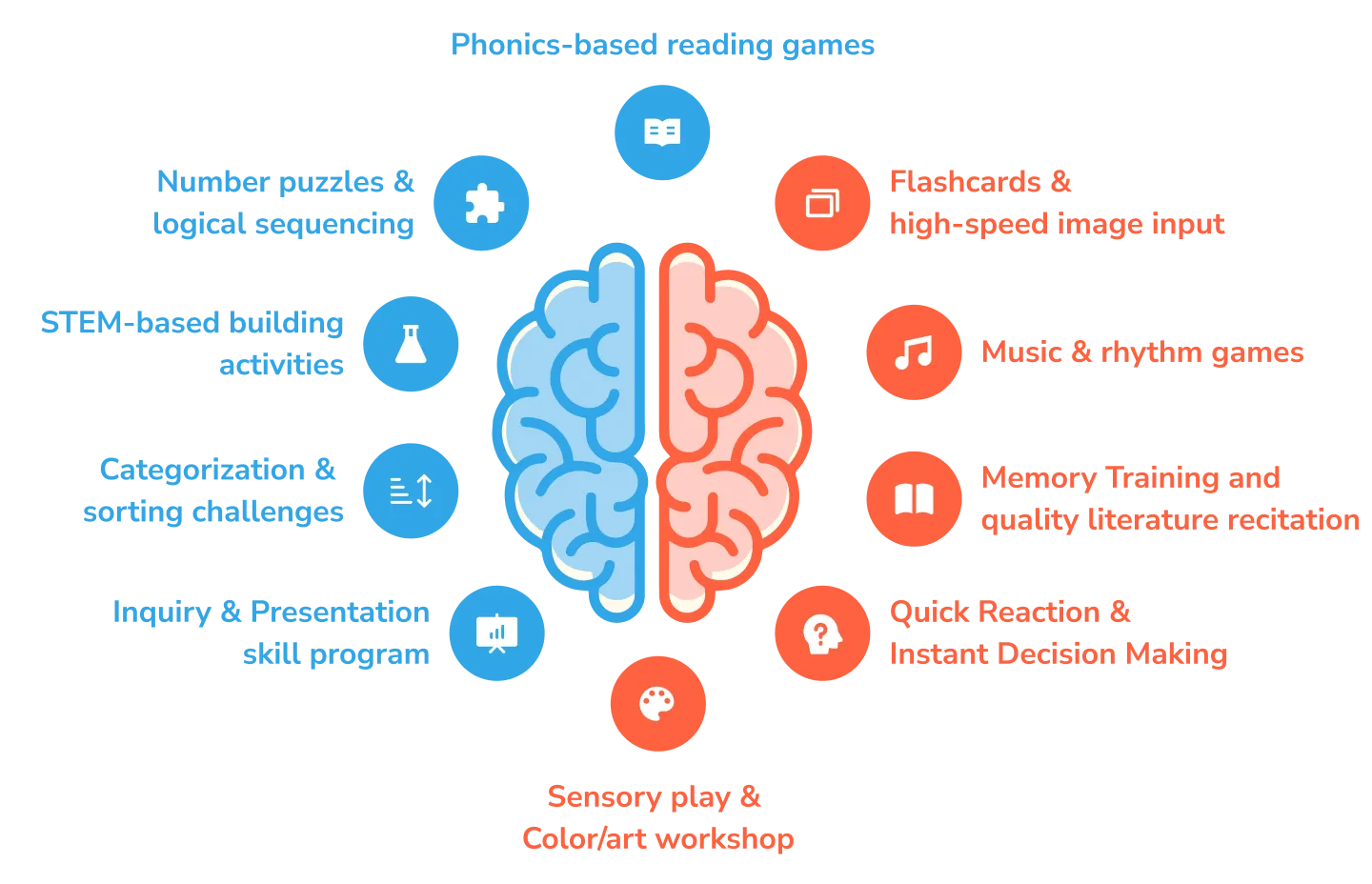
The Law of Talent Decline
Neuroscience confirms: The potential to acquire new abilities is greatest when children are young.
As we grow older, the plasticity of the brain naturally decreases. If a certain function (such as perfect pitch, a second language, or empathy) is not stimulated during its critical window, the brain becomes less receptive to it later on. Early education is not about academic pressure—it’s about maximizing this natural window of growth.
Planting and Strengthening the Brain
Japanese Values in Education
Key Features of Mind Spark Academy's Education
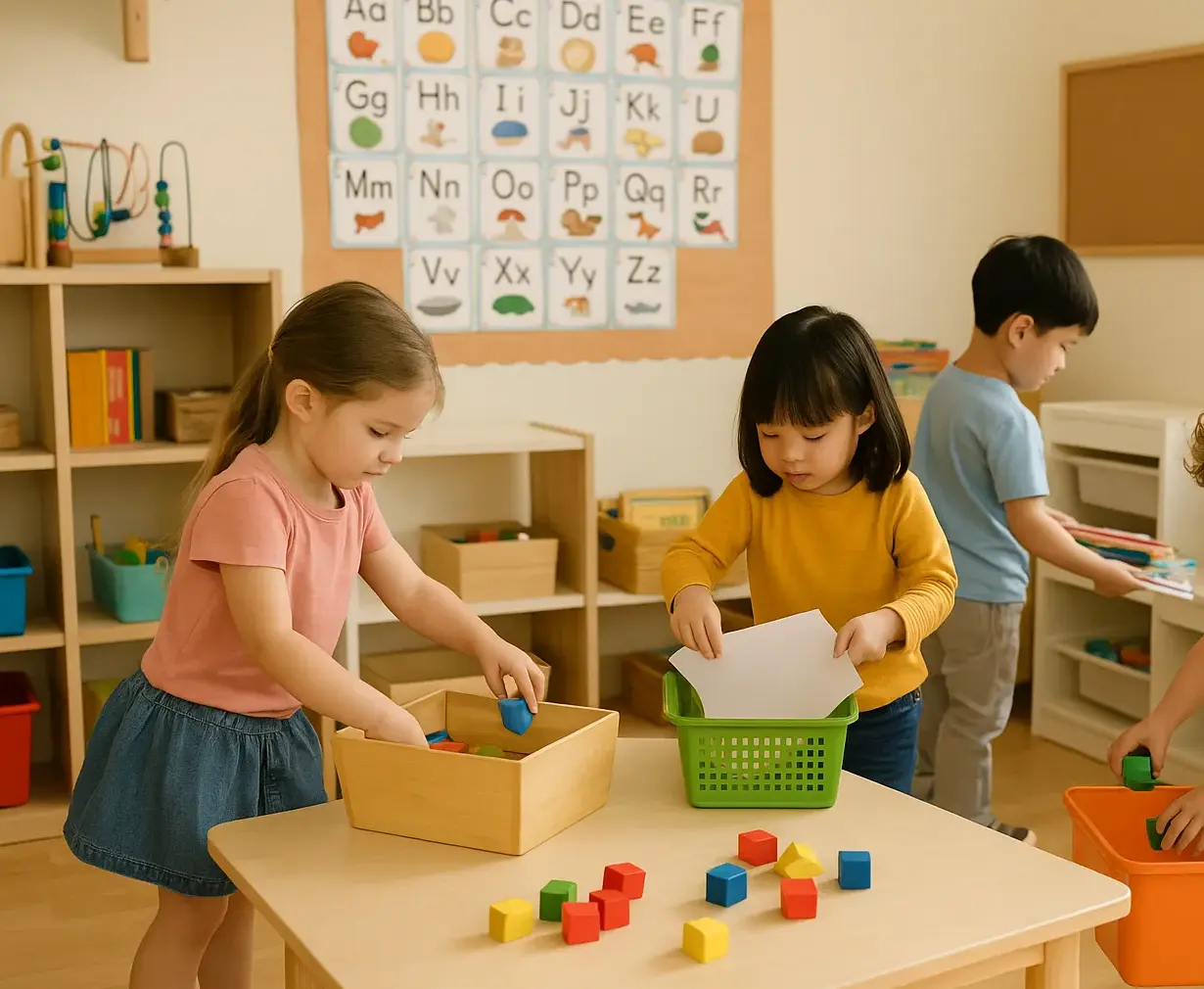
At Mind Spark Academy, we promote cooperation and social responsibility through a system based on Japanese discipline. Children naturally learn social manners and build strong relationships by following rules.
We bring to Canada a world-renowned Japanese early education method, rooted in brain science and celebrated for nurturing exceptional talent across the globe.
Available only at our school in North America, this proven approach has inspired the growth of countless gifted children worldwide.
Using Japan’s highest-quality early learning materials — engaging, diverse, and fun — we create an environment where children not only excel academically, but also develop the manners, respect, and empathy that define Japanese values.
The Significance of Incorporating Japanese Educational Methods
at a Preschool in Canada
Etiquette and Manners
In Japan, children learn respect from an early age through practices like bowing and polite language, greeting teachers properly, and treating others with courtesy. This culture of respect has gained international attention, particularly for its influence on business manners and social interactions.
Cleaning Activities
In Japanese schools, students clean classrooms and hallways daily—not just to keep them tidy, but to learn teamwork, responsibility, and community spirit. This tradition fosters consideration for others and social responsibility, inspiring some schools in Europe and the U.S. to consider adopting it.
The Importance of Group Activities
Japanese schools highly value group activities and emphasize cooperation. For example, during field trips and sports events, teamwork is more important than individual achievement. This approach reflects the importance of teamwork in the workplace and is recognized worldwide for its effectiveness.
Punctuality
In Japan, punctuality is highly valued, and being late or wasting time is strongly discouraged. This strict time management is respected worldwide, and Japan’s accuracy in business and public transportation systems is often cited as a model.
Self-Management Skills
Japanese schools encourage children to develop self-management skills by planning and acting on their daily lives and learning activities. This fosters independence, helping children set and achieve goals. This self-management ability is highly valued internationally, particularly in Western educational systems.
These Japanese educational methods contribute significantly to the development of children’s characters. At Mind Spark Academy, we incorporate these cultural aspects to provide a balanced environment that fosters ethics, social skills, and academic growth in children.
Why We Incorporate Japanese Educational Materials
Materials That Turn Learning Into Fun
Japanese educational materials are designed to be engaging and visually appealing, making learning fun for children. For example, classrooms often use flashcards and puzzles to turn learning into play, helping kids absorb knowledge naturally while staying interested. This supports their academic growth.
Wide Variety of Materials
Japanese educational materials are very diverse. From puzzles that build logical thinking to memory cards and hands-on crafts that develop sensory skills, many tools meet different learning needs. This variety helps children grow in a well-rounded way, gaining skills in multiple areas.
Age-Appropriate Materials
Japanese materials are designed to match children’s developmental stages, making content age-appropriate and easy to understand. This lets children learn at their own pace, building confidence as they master new concepts without feeling overwhelmed.
By using Japanese educational materials, we create an environment that inspires children to learn and grow academically and personally. These materials encourage independent learning and deeper understanding, helping children explore new ideas and build a strong foundation for success.
Our staff mainly consists of experienced Japanese teachers, who help children naturally absorb Japanese manners and ways of thinking, enriching the Mind Spark Academy experience.
Enrichment Through Traditional Japanese Arts
The Abacus (Soroban)
An excellent tool for fostering mathematical thinking. Benefits include:
- Improved calculation skills
- Increased concentration and patience
- Balanced left and right brain development
Calligraphy (Shodo)
The art of writing beautiful characters. Benefits include:
- Improved concentration and dexterity
- A sense of mental calmness
- Cultivation of aesthetic sensibility
3. Origami (Paper Folding)
The art of folding paper to create shapes. Benefits include:
- Enhanced creativity and problem-solving
- Improved dexterity and spatial awareness
- A sense of accomplishment and confidence
STEAM & Early Academics
STEAM Education: The Foundation for Future Innovators
STEAM education stands for Science, Technology, Engineering, Arts, and Mathematics, a multidisciplinary approach that integrates these five areas. Introducing STEAM education in early childhood fosters creativity, critical thinking, and problem-solving skills, while also sparking children’s interest in various fields.
Science
Children engage in experiments and observations, learning the laws of nature. This nurtures curiosity and exploration.
Technology
Using digital tools and gadgets, children learn the basics of technology. Programming and basic robotics are excellent examples of how children can develop an understanding of technology.
Engineering
Through building and modifying objects, children enhance their logical thinking and spatial awareness. Activities like playing with blocks and construction toys are great examples.
Arts
Activities such as music, painting, and dance help children express their emotions and develop creativity. They also learn about color, shapes, and balance through artistic exploration.
Mathematics
Children learn about numbers, patterns, and shapes, improving their logical thinking and problem-solving skills. They can integrate mathematical thinking into play and everyday life.
Benefits of STEAM Education
- Develop the ability to think critically and creatively solve problems by integrating different disciplines.
- Enhance social and communication skills, teaching the importance of teamwork and cooperation.
- Gain a flexible and open-minded perspective for future learning and career decisions through early exposure to diverse fields.
Beyond STEAM: Unlocking Your Child’s Full Potential
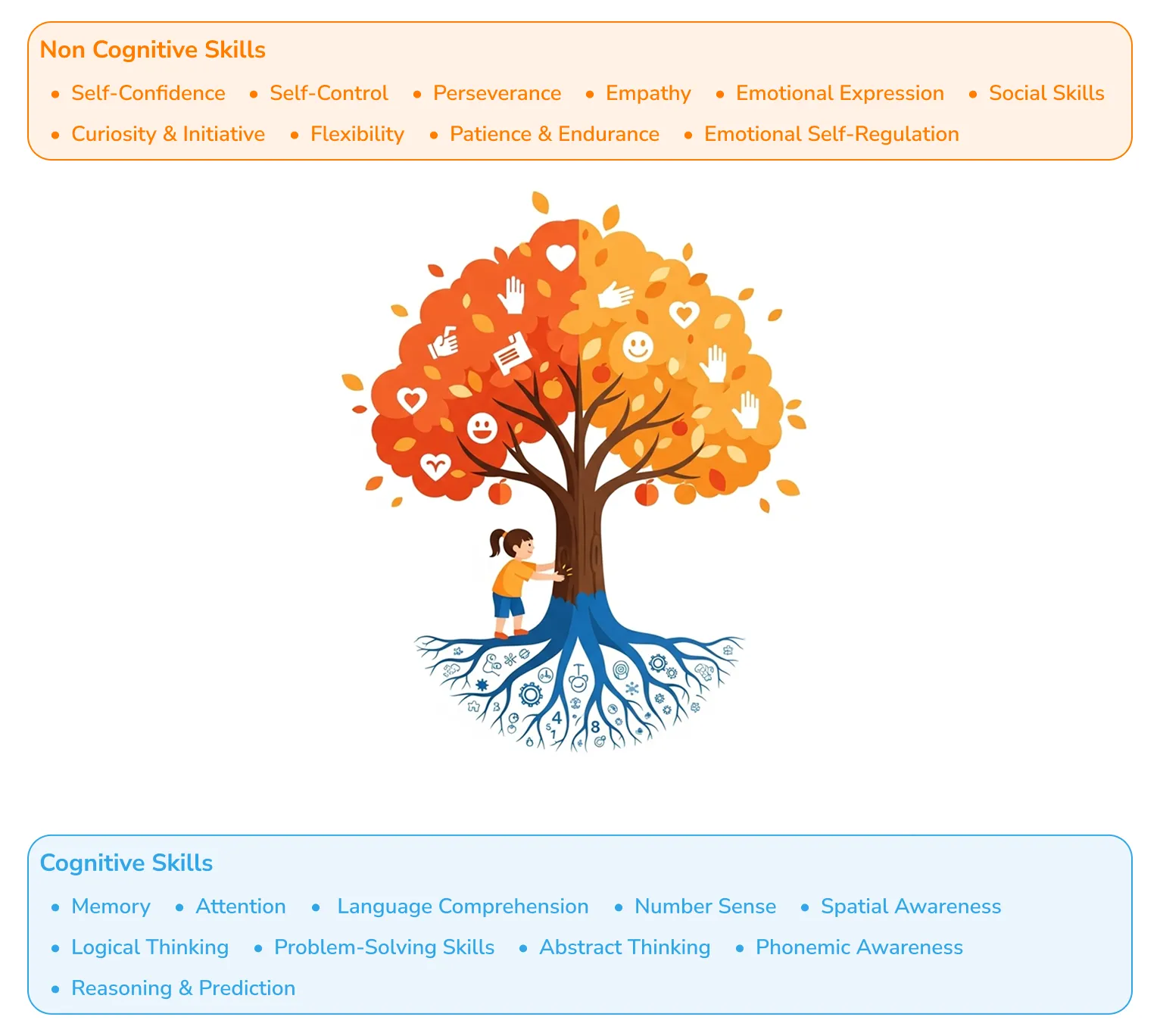
While a strong STEAM foundation is crucial, our true mission is to unlock a child’s full, balanced potential. We use a holistic, neuroscience-based approach to cultivate not just intellectual prowess, but also emotional intelligence, creativity, and strong character.
This whole-child philosophy ensures that students develop both the cognitive skills for academic success and the non-cognitive skills for a happy, resilient, and fulfilling life.
Cognitive Skills (IQ & Thinking Abilities)
Abilities related to knowledge, thinking, and learning—the foundation of problem-solving and academic success.
|
Skill
|
How We Enhance It
|
Real-World Examples
|
|---|---|---|
|
Memory Power
(Photographic & Instant) |
Through flashcards, memory games, and visual training.
|
Instantly memorizes dozens of images or words; recites poems from memory.
|
|
Language Development
|
Daily storytelling, reading aloud, and recitation.
|
Develops a rich vocabulary and strong verbal expression; early writing skills.
|
|
Math & Number Sense
|
Dot cards, visual math, and hands-on materials.
|
Grasps quantity, mental math, and operations far beyond their age level.
|
|
Spatial & Shape Recognition
|
Puzzle work, tangrams, and origami.
|
Builds strong 3D and geometric thinking, which is excellent for STEM readiness.
|
|
Logical Reasoning
|
Question-based learning and critical thinking games.
|
Can explain “why” and “how” with clarity; deepens natural curiosity.
|
|
Abstract Thinking & Prediction
|
Imaginative exercises and “what-if” scenarios.
|
Thinks in possibilities and hypotheticals with creativity and flexibility.
|
Non-Cognitive Skills (EQ & Character)
|
Skill
|
How We Enhance It
|
Real-World Examples
|
|---|---|---|
|
Concentration
|
Short, focused, high-intensity learning activities.
|
Can stay focused for longer than peers; remains calm and composed during tasks.
|
|
Self-Esteem
|
Constant positive reinforcement and recognition of effort.
|
Gains confidence to try new things and believes “I can do it.”
|
|
Persistence (Grit)
|
Encouragement to complete tasks and celebrate success.
|
Doesn’t give up easily; enjoys challenges and the process of improvement.
|
|
Empathy
|
Emotional learning, storytelling, and guided reflection.
|
Learns to read others’ emotions and treat friends with kindness and respect.
|
|
Emotional Regulation
|
Daily practice of gratitude and calming techniques.
|
Manages frustration well, expresses feelings constructively, and handles transitions smoothly.
|
-
Note for Parents
Cognitive and non-cognitive skills develop together during early childhood. Play and daily experiences are the best opportunities to nurture both. For example, puzzle play strengthens both spatial awareness (cognitive) and perseverance (non-cognitive).
Foundational Concepts Children Should Master in Early Childhood
(Ages 2–5)
Building strong basic concepts during early childhood lays the foundation for future learning, problem-solving, and social skills.
These concepts can be grouped into key developmental categories
1. Colors
- Red, Blue, Yellow, Green, Orange, Purple, Pink, White, Black, Brown
- Light / Dark
2. Shapes
- 2D: Circle, Triangle, Square, Rectangle, Oval, Star, Heart
- 3D (Advanced): Sphere, Cube, Cylinder, Pyramid
3. Size
- Big / Small
- Long / Short
- Thick / Thin
- Tall / Short (height)
4. Quantity & Number Concepts
- Many / Few, More / Less
- Counting from 1 to 10 (ideally up to 20)
- Understanding number order (1st, 2nd, 3rd…)
- 1-to-1 correspondence
5. Spatial / Positional Concepts
- Up / Down, Front / Back, In / Out
- Top / Bottom / Middle
- Sideways / Vertical
- Right / Left (mastered by 4–5 years)
6. Comparatives
- Same / Different
- Heavy / Light
- Warm / Cold
- Fast / Slow, Hard / Soft
7. Time Concepts
- Morning / Afternoon / Night
- Now / Later / Before
- Days of the week
- Seasons (Spring, Summer, Fall, Winter)
- Yesterday / Today / Tomorrow
8. Order & Sequence
- First / Middle / Last
- Taking turns and lining up
- Understanding ordinal numbers (1st, 2nd…)
9. Sorting & Categorizing
- Group by color, shape, or purpose
- Recognize categories (Fruits, Vehicles)
- Identify “odd one out”
10. Sensory & Descriptive
- Soft / Rough / Smooth / Sticky
- Sweet / Salty / Sour / Bitter
- Loud / Quiet, Bright / Dark
11. Social & Relational
- Family roles (Mom, Dad, Sibling)
- Difference between self and others
- Common places (Home, School, Park)
- Knows own name, age, and address
12. Actions & Emotions
- Verbs: Jump, Walk, Run, Throw, Sit
- Emotions: Happy, Sad, Angry, Scared, Shy
Tips for Parents
- Learn through play: Puzzles build shape and spatial recognition; pretend play strengthens categorization and sequencing.
- Use daily life as learning: Compare, sort, and talk about order naturally during routines.
- Read and explore together:Storybooks, flashcards, and role-play accelerate concept understanding.
Communication & World Discovery Program
We use advanced methods like presentations, research projects, observation records, and Fermi estimation to develop critical thinking and problem-solving skills, preparing children to be globally competitive with diverse perspectives.
Our curriculum includes learning about Canada and the world—famous landmarks, cuisines, currencies—to broaden children’s global understanding.
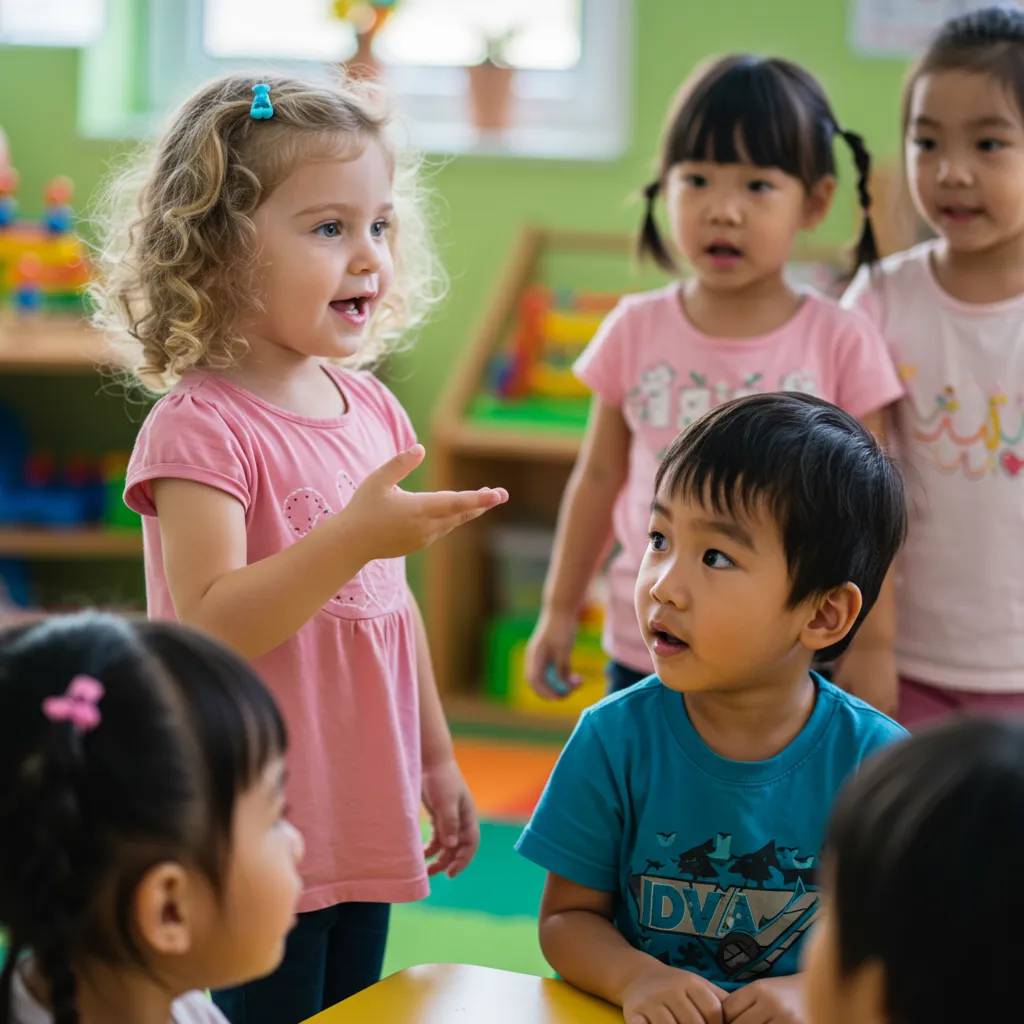
Fermi Estimation
Reason: Fermi estimation uses intuition and estimation to solve problems. For children aged 2–5, it teaches concepts of size and quantity, e.g., "How big do you think a bear's foot is?" encourages approximate reasoning without precise calculations.
Effect: It strengthens intuitive prediction, fosters logical thinking, and builds a foundation for mathematical reasoning and flexible problem-solving.
Presentations
Reason: Presentations let children practice sharing ideas. For 2–5-year-olds, explaining their thoughts develops language skills and structured thinking.
Effect: They improve communication, build self-confidence, and learn to speak confidently in front of others.
Debate
Reason: Debate helps children understand different viewpoints and express opinions logically. Even at ages 2–5, they can join simple debates (e.g., "Do you like dogs or cats?") to see other perspectives.
Effect: Debating teaches respect for others' views and logical expression, strengthening problem-solving, social skills, and constructive discussion abilities.
Research-Based Learning
Reason: Research-based learning lets children explore interests, find information, and organize it. Even young children can research simple questions, fostering curiosity and a love of learning.
Effect: It builds skills in gathering and understanding information, while sharing findings improves self-expression and problem-solving.
Global education
Reason: To prepare children for success in a global society by combining knowledge of diverse countries with advanced learning methods like research and presentations.
Effect: Students develop critical thinking, problem-solving, and self-management skills, gain a broad worldview, and learn to respect diversity and cooperate responsibly.
First Step Program for Age 2
Why Age 2 Matters
By age two, the brain has already reached about 80% of its adult size. At this stage, the right brain dominates, making it the golden period for intuition, imagery, large memory capacity, and sensory-based learning.
The emotions and habits formed during this time are deeply connected to instinct, influencing a child’s future personality, learning attitudes, and daily routines.
Right Brain vs. Left Brain Development
Left Brain
Grows step by step, gradually building skills in language, reading, writing, logic, math, and reasoning.
Right Brain
Develops rapidly and “blooms” before age three, excelling in imagination, intuition, and large-scale input.
This is why right-brain experiences at age two — joy, habits, and the love of learning — create a powerful foundation for left-brain learning after age three.
Program Features
Massive Input
Foundational Concepts
Right-Brain Activities
Non-Cognitive Skills
Physical & Fine Motor Development
Foundations of left-brain development
Left-Brain Development and Approach
When It Begins
- Full left-brain development begins around age three, but for some children, it may start as early as 2.5 years.
- The left brain strengthens throughunderstanding explained by words
A Key Sign: The “Why?” Stage
- When children begin asking “Why?” about everything, it signals the start of left-brain growth.
- At this moment, teachers respond with flexible, individualized approaches to nurture deeper understanding.
- It marks the stage where children begin to learn through explanations.
Four Foundational Steps for Early Left-Brain Development
step 1
Understanding Names and Uses
- “This is a cup → You use it to drink water.”
- “This is a spoon → You use it to eat food.”
Learning names together with their purposes.
step 2
Recognizing “Same” (Concept Integration)
- A real apple
- a toy apple
- a picture book apple
- the word “apple”
Understanding that they all represent the same concept.
step 3
Categorization (Grouping by Commonality)
- Dog, cat, lion → “Animals”
- Apple, banana, grape → “Fruits”
- a picture book apple
- Car, train, airplane → “Vehicles”
Recognizing that items with shared traits belong to the same group.
step 4
Differences and Patterns (Comparison & Sequencing)
- Finding the odd one out
- Comparing big/small, long/short
- Recognizing patterns (red–blue–red–blue…)
- Understanding order (first, second…)
Building the logical foundation by combining same and different.
Educational Value
- The left brain cannot skip steps; each stage must be built sequentially.
- At age two, mastering these four steps is essential for later language, logical thinking, and academic readiness.
- By also offering opportunities to attempt slightly more advanced activities, children develop problem-solving, adaptability, and resilience — fueling remarkable growth in the 3–5 curriculum.
